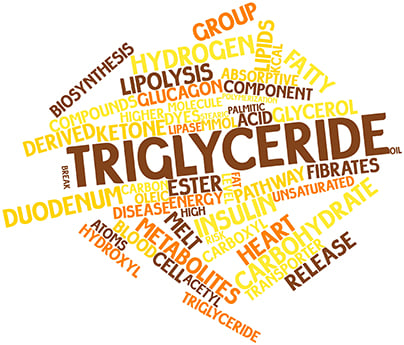Triglycerides are a type of fat in the body made of up a glycerol compound attached to three fatty acids. The fatty acids can be classified as saturated, monounsaturated, polyunsaturated or a mixture. They are a source of energy stored in adipose tissue which protects the internal organs from injury and provides insulation for the body. Fats are calorically dense and provide twice as many calories per gram as proteins and carbohydrates. When consumed in excess, fats contribute to obesity, heart disease, metabolic syndrome, fatty liver disease, and cancer, however, avoiding all fats is detrimental as well. An appropriate amount of the right types of fat is important for optimal health.

The prevalence rates of elevated triglyceride levels was 27% in adults older than 20 years from 2007-2010. Among male adolescents, the prevalence rate was found to be 9.4%, while among female adolescents, the rate was 6.7%. There is limited data on the prevalence rates among children.1
Saturated fatty acids are dense and solid at room temperature (e.g. butter and coconut oil). Polyunsaturated fats tend to be liquid at room temperature (vegetable oils). Trans fatty acids are found naturally in dairy and animal products or produced commercially by partial hydrogenation. Shortening, baked goods, and margarine all contain trans fatty acids that increase the risk of cardiovascular disease. Consumption of excess saturated and trans fatty acids that are not needed for energy are stored as triglycerides in adipose tissue. This tissue can be found under the skin as subcutaneous tissue or around the organs as visceral adipose tissue which contributes to an inflammatory environment in the body. Having elevated triglyceride levels does not often result in symptoms directly but can cause acute pancreatitis, which results in severe abdominal pain and, if severe enough, death. Basically, high triglycerides result from a combination of genetic predisposition in conjunction with modern disease-causing foods, especially processed foods.
Causes of elevated triglycerides include
Visceral adipose tissue contributes to insulin resistance and diabetes which, in turn, cause further dysfunction. Insulin stimulates the storage of triglycerides and increases body fat when there is an excess of calories consumed. Excess glucose consumed is also converted into fatty acids which are also stored as triglycerides. Insulin inhibits the breakdown of fat leading to further weight gain, worsening insulin resistance, and increased risk of heart disease and cancer.
Elevated triglyceride levels often occur with abnormal HDL and LDL cholesterol levels. It is associated with abnormalities such as low levels of protective HDL, the presence of small dense harmful LDL particles, insulin resistance, and increased coagulability of blood. Meeting the criteria for metabolic syndrome (low HDL cholesterol and elevated triglycerides, glucose, waist circumference, and blood pressure) dramatically increases the risk of heart disease, stroke, and diabetes.
Weight loss helps lower triglyceride levels. A 5-10% decrease in body weight can lower triglyceride levels by 20-30%.2 A Nutritarian diet is the safest and most effective way to lose weight
Regular exercise will help lower triglyceride levels in conjunction with a Nutritarian diet. Aim for a combination of interval training, body strengthening, and at least 2, 20 minute aerobic exercise sessions per week with two resistance training sessions.
Alcohol consumption is a cause of hypertriglyceridemia in some patients, leading to fatty liver disease. Avoiding alcohol will help lower triglyceride levels and improve liver function.
ONLINE: All members of DrFuhrman.com can search the Ask the Doctor archives for discussions on this topic. Platinum and Diamond members can connect with Dr. Fuhrman by posting questions in the forum. Not a member? Join now.
IN PERSON: Book a stay at Dr. Fuhrman’s Eat to Live Retreat in Southern California. With options ranging from one, two and three months (and sometimes longer) you will be under Dr. Fuhrman’s direct medical supervision as you hit the “reset” button on your health. For more information: (949) 432-6295 or [email protected].
EVENTS: Join Dr. Fuhrman for an online boot camp, detox or other event. During these immersive online events, you’ll attend zoom lectures, follow a special meal plan, and have access to a special, live Q&A session with Dr. Fuhrman. Learn more about events.
The following are sample questions from the Ask the Doctor Community Platinum and higher members can post their health questions directly to Dr. Fuhrman. (All members can browse questions and answers.)
My cholesterol vastly improved since last year except for triglycerides.
2013:
Total: 160
LDL: 89
HDL: 43
ratio: 3.7
Triglycerides: 139
2012:
Total: 209
LDL: 137
HDL: 56
ratio: 3.7
Triglycerides: 79
I am 5'9'', 166 lb. I do pinch almost 2 inches at the belly and about 1 at the thigh, very skinny everywhere else. So, is the high triglyceride level anything to worry about? Is it due to being overweight? My target weight is 149 lb.
High triglycerides can be related to you not quite reaching your ideal weight yet but can also be related to you eating too many grains, fruits (>4 cups daily or so) or overeating at your meals or snacking, etc. But, the level isn’t concerning since it is at the upper side of normal and your other numbers are so good. You may want to check it again in the future once you have lost even a little more weight and modified your routine, just to notice more improvement.
In your book Eat to Live, you wrote that excess consumption of refined carbohydrates may lead to higher levels of triglycerides in the blood. Does a higher level of triglycerides contribute to clogging of the arteries? I’m just trying to understand how triglyceride levels can be a predictor of heart disease.
Having high triglyceride levels is almost always a marker for insulin resistance, which leads to endothelial dysfunction, inflammation, and vascular disease.